Ever wondered how long solar panel batteries last? They are key to powering our homes with solar energy. These batteries can work for 5 to 25 years. Among them, lithium-ion batteries shine with a 15-year life span.
Many things can affect how long a battery lasts. This includes the type of battery, how it’s installed, and how it’s taken care of. Good installation and regular maintenance can make batteries last longer.
Key Takeaways
- Solar panel batteries are vital for off-grid solar power systems, providing energy storage when sunlight isn’t available.
- Lithium-ion batteries typically last up to 15 years, making them the most prevalent choice.
- Factors influencing battery longevity include battery type, installation quality, depth of discharge, cycle life, environmental conditions, and maintenance.
- Proper installation and regular maintenance are crucial for maximizing solar battery life.
- Investing in high-quality batteries and ensuring professional installation are fundamental for achieving extended battery lifespan.
Understanding Solar Batteries: An Introduction
Solar batteries are key in making solar energy storage more effective. They store extra energy from solar panels. This stored energy keeps the power running at night or when it’s cloudy. So, houses can use solar energy even when solar panels are not producing power.
Off-grid solar power systems give people more control over how they use energy. With solar batteries, homeowners can use energy optimally. This lowers their need for the grid and boosts energy independence. It leads to living more sustainably and saving money by cutting down on utility bills.
Solar batteries are not just about energy independence. They also make solar power systems more flexible. This means users can better use and save energy. From homes to big businesses, these batteries let people use renewable energy in many ways. Thus, having good solar batteries in a solar system is crucial for maximizing renewable energy investments.
Types of Solar Batteries and Their Lifespan
Choosing the right solar battery is key for top performance and long life. Knowing about different technologies helps you decide well. It’s important to consider the *solar battery lifespan* when picking one.
Lead-Acid Batteries
Lead-acid batteries are an older option that costs less. They usually last 3 to 5 years. But, they need more upkeep and don’t last as long. So, they might not save you money or effort in the long run.
Lithium-Ion Batteries
Lithium-ion batteries lead the market with a lifespan over 15 years. They need little maintenance and work well. Their long life and reliability make them a great choice for saving energy.
Flow Batteries
Flow batteries are newer and show a lot of potential. They might cost more at first. But, they can last 15 to 25 years. They also work well even when fully discharged. This makes them great for those who want to save on maintenance and have long-term storage.
Now, let’s look at the main features of these batteries:
| Battery Type | Typical Lifespan (Years) | Maintenance Requirements | Key Feature |
|---|---|---|---|
| Lead-Acid | 3-5 | High | Cost-Effective |
| Lithium-Ion | 15+ | Low | High Efficiency |
| Flow | 15-25 | Low | 100% Depth of Discharge |
Choosing the right type and *taking care of your solar batteries* can help your system last longer and work better.
Factors that Affect Solar Battery Longevity
It’s key to know what affects how long solar batteries last. Understanding this helps them work better for longer. Things like the battery type and how well you take care of them make a big difference.
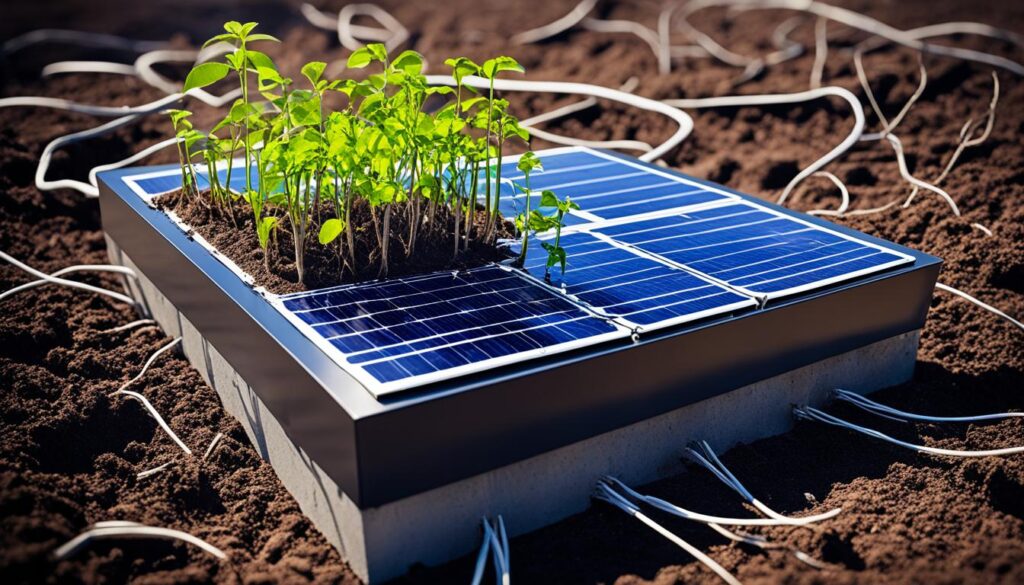
Battery Type
What kind of battery you choose plays a big role in how long it will last. Lithium-ion and flow batteries are usually more durable than lead-acid ones. The chemistry of the battery impacts its lifespan, especially under how it’s used and where it’s kept.
Installation Quality
A good setup is important to get the most from your battery. Having pros install your system helps avoid problems. It means safer use and the system works better.
Depth of Discharge (DoD)
Depth of Discharge tells us how much of the battery’s energy is used up. It’s key to not use too much of the battery’s power too often. Doing so can make the battery not last as long or perform well.
Cycle Life
Cycle life is the number of times a battery can be fully used and recharged. Batteries that handle more cycles tend to last longer. This is good for their long-term use and cuts down on how fast they wear out.
Environmental Conditions
Where you keep your batteries also affects how long they last. Very hot or cold temperatures can wear down batteries faster. Keeping them in a place that’s not too extreme helps them last longer.
Maintenance Practices
Keeping up with regular care is essential for solar batteries. Watching how they’re doing and fixing small problems early is smart. This helps the batteries work well for a longer time.
Solar Battery Lifespan Compared to Solar Panels
It’s smart to look at how long solar panels and batteries last. Normally, solar panels keep working for 20 to 30 years. This is longer than solar batteries, which might only last up to 15 years.
This big difference in how long they last is key. It shows why picking top-quality batteries is really important. With the best batteries and careful setup, you can store more solar energy. This means your solar system can do more for you over time.
| Component | Lifespan | Optimal Use |
|---|---|---|
| Solar Panels | 20-30 years | Energy Production |
| Lithium-Ion Batteries | Up to 15 years | Solar energy storage |
At some point, you’ll likely need new batteries for your solar system. So, being ready for this is wise. Keep up with checking and caring for your batteries. This helps them work well for a long time.
How to Maximize the Life of Your Solar Batteries
Making solar batteries last a long time is key for solar power systems to work well. Doing a few things right can make my batteries last longer. This means they’ll work well for years.
Optimal Storage Environment
Keeping batteries in the right place is very important. They need to be where it’s not too hot or too cold. This keeps the batteries from getting damaged and helps them work well for a long time.
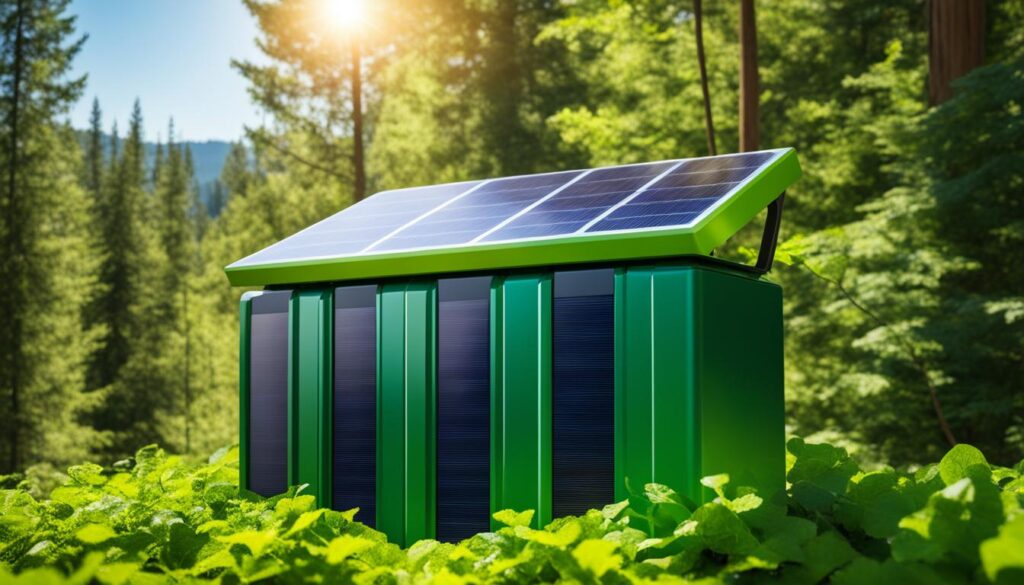
Regular Maintenance
It’s also crucial to check on the batteries often. I look after them, fix small issues quickly, and use apps to keep an eye on them. This active care is key to extending battery life.
Using Smart Battery Management Systems
Smart battery tools are really helpful too. They stop the batteries from getting too full or too empty, which can harm them. With these tools, I know I’m using my batteries in the best way possible.
- Store batteries in a controlled environment
- Conduct regular maintenance checks
- Utilize smart battery management systems
The Importance of Solar Battery Warranties
Buying solar batteries is a big step, especially for how long they last and how well they work. Knowing about solar battery warranties is vital. They make sure your solar setup stays reliable and give you an idea of how long the product will last.
Understanding Warranty Terms
Understanding your solar battery warranty is key. Warranties explain how long the battery should last and when you might need a new one. Knowing these facts will help you understand what to expect and any possible costs in the future.
Coverage for Cycle Life
Many warranties cover the cycle life of the battery. This is how many times the battery can be fully charged and discharged before its performance drops. This information is essential for knowing how long you can use the battery and if the warranty fits that.
Duration of the Warranty Period
The time a warranty lasts changes by brand and battery type. For instance, lithium-ion batteries usually come with over a 10-year warranty. This shows they are top quality and can last a long time. It’s important to know the warranty’s duration to prepare for any replacements needed.
| Battery Type | Typical Warranty Period | Cycle Life Coverage |
|---|---|---|
| Lithium-Ion | 10-15 years | Up to 5000 cycles |
| Lead-Acid | 3-5 years | Up to 1000 cycles |
| Flow Battery | 15-25 years | Unlimited cycles |
Knowing about the warranty details, cycle life coverage, and how long the warranty lasts lets you pick the right solar battery. Being well-informed ensures your solar power system works well and stays efficient for a long time.
Deep Cycle Batteries for Solar: What Are They?
The performance and life of your solar setup rely heavily on the batteries. We will explore the role and key aspects of deep cycle batteries for solar.
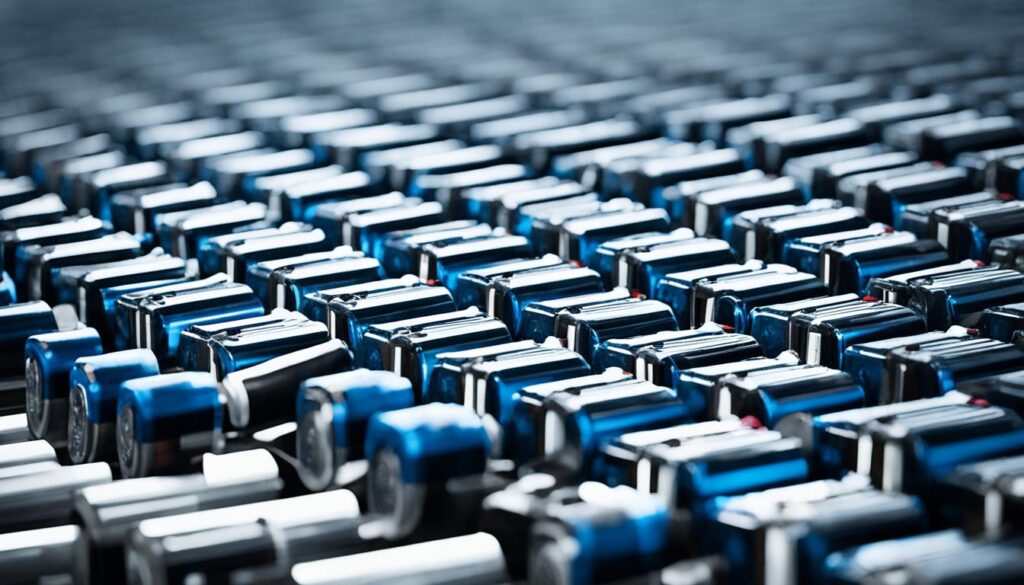
Defining Depth of Discharge
Depth of Discharge (DoD) shows how much of a battery’s power is used. It’s important for deep cycle batteries to handle 80% DoD without harm. This feature is key for long-lasting energy storage in solar systems. Unlike other types, deep cycle batteries keep working well under heavy loads, a must for solar power.
Differentiating Deep Cycle from Shallow Cycle
Knowing the difference between deep and shallow cycle batteries helps in choosing. Deep cycle batteries, with their high DoD, are perfect for ongoing, intense use.
| Feature | Deep Cycle Batteries | Shallow Cycle Batteries |
|---|---|---|
| Depth of Discharge | 80% or more | Less than 50% |
| Expected Longevity | Extended | Shorter |
| Application Suitability | Solar and renewable energy | Starter or emergency backups |
| Performance under Heavy Use | High | Low |
| Cost | Higher initial cost | Lower cost |
Choosing deep cycle batteries for your solar power setup boosts its working and lifespan. Make the right choice to get the most out of your solar energy system.
Solar Battery Degradation and How to Address It
Solar battery degradation is a natural process affected by many factors. By understanding what causes it, we can take steps to make solar batteries last longer.
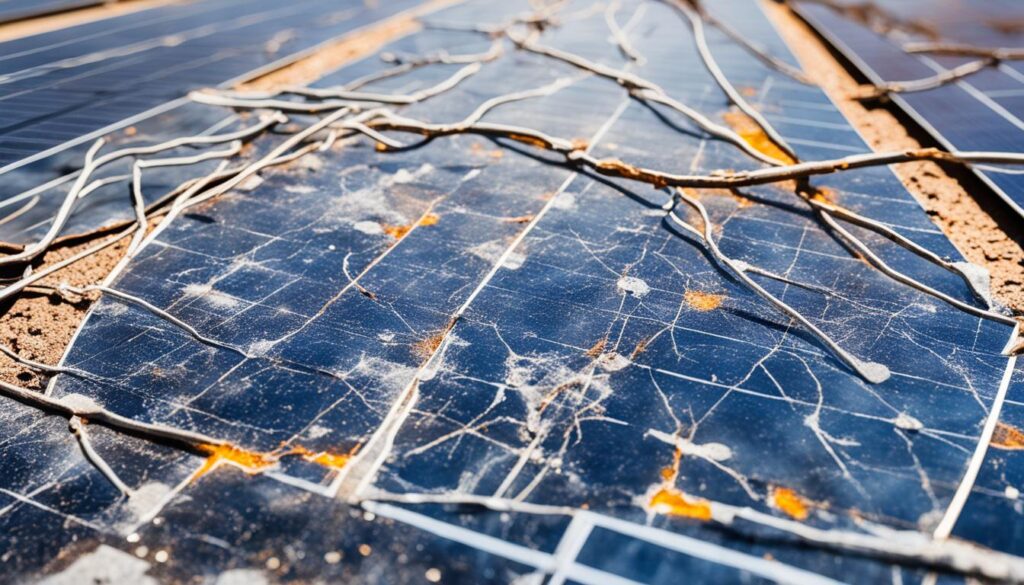
Causes of Battery Degradation
Several things can cause solar battery life to decrease. These include overcharging, deep discharges, and very high or low temperatures. It’s key to spot these issues early to save your solar batteries.
Preventative Measures
To slow down solar battery aging, we need to use smart strategies. Smart battery managers can stop overcharging and deep discharges. You should also follow the recommended Depth of Discharge (DoD). Keeping your battery away from extreme temperatures is crucial too.
Monitoring Battery Performance
Keeping a close eye on your battery’s performance is vital. Performance apps help you track it constantly, catching any problems early. This step not only boosts efficiency but also helps your solar batteries last longer.
Replacing Your Solar Panel Batteries: What You Need to Know
Knowing when to switch out your solar panel batteries is key. If you notice they’re not holding as much charge, have more outages, or see the case bulging, it’s probably time. Being aware of these signs helps prevent sudden problems. This keeps your power system running smoothly.
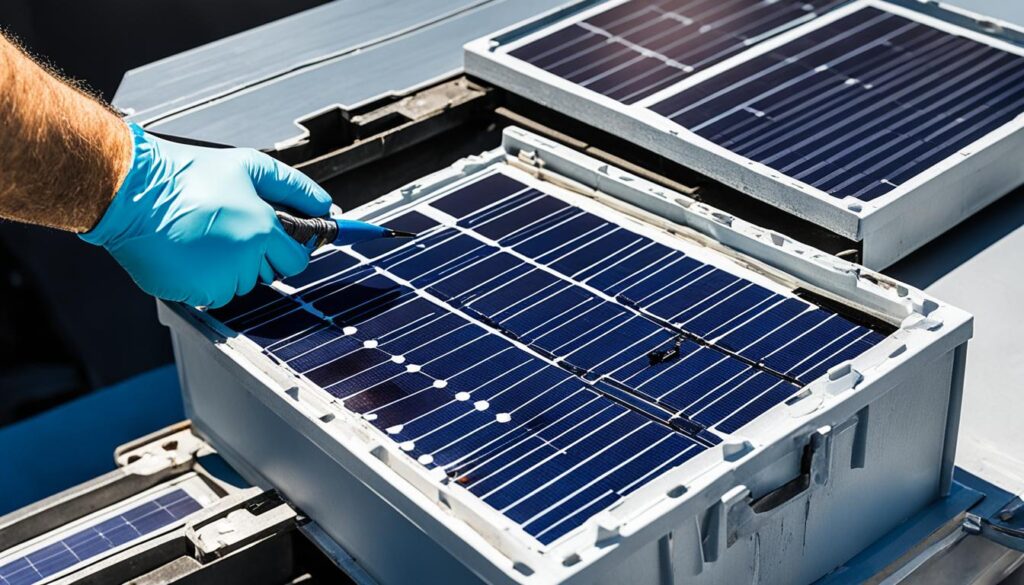
Signs That It’s Time to Replace
All batteries wear out eventually. Look for these clues that a change is needed:
- Decreased Capacity: A weaker hold of energy points to a need for new batteries.
- Frequent Power Interruptions: Many interruptions in power suggest the batteries aren’t working right.
- Swelling or Leakage: If you see your batteries changing shape or leaking, you need to act fast.
Choosing the Right Replacement Battery
Getting the right battery for your system is very important. Keep these things in mind:
- Compatibility: Make sure the new battery will work well with your solar setup.
- Cycle Life: Pick a battery that can last a long time to keep your system running well.
- Storage Capacity: Select a battery that can store as much energy as you need. This helps maximize solar battery life.
Installation Tips
How you install the new batteries is crucial. Follow these tips for the best results:
- Hire Professionals: It’s safest to get an expert to install the batteries correctly.
- Check Specifications: Make sure the new battery matches what your system requires.
- Regular Maintenance: Keep a strict maintenance schedule to maximize solar battery life.
Watching for battery wear signs and picking the right replacements allows you to keep your solar system healthy and efficient.
How Long Do Solar Panel Batteries Last?
Solar panel batteries can last from 5 to 25 years. This big range is due to different factors like battery type, how you use them, and the environment. The most common choice is lithium-ion, offering about 15 years of life. But some like flow batteries can last even longer, sometimes over 15 years, especially if they’re fully discharged.
It’s key to know how long solar panel batteries last to plan for their upkeep or if you need to replace them. Lowering your expectations for lead-acid batteries might be a good idea. They usually last shorter than lithium-ion or flow batteries. Doing regular check-ups and keeping an eye on them can help your solar system last longer.
| Battery Type | Expected Lifespan | Features |
|---|---|---|
| Lead-Acid | 3-5 years | Cost-effective, shorter lifespan |
| Lithium-Ion | Up to 15 years | High efficiency, long cycle life |
| Flow Batteries | 15-25 years | Full depth of discharge, longer lifespan |
With such a wide range in lifespan, understanding solar panel batteries can be complex. Managing them well and having a good environment is crucial. This way, your solar batteries can work their best, giving you power for many years.
Key Considerations When Choosing Solar Batteries
Choosing the right solar batteries is crucial for off-grid power setups. You need to look at several factors to pick the best one. Performance, cost, and how well they work together are key.
Cost vs. Longevity
When you choose solar batteries, look at how much they cost vs. how long they last. Spending more initially can lead to savings later on. It can mean less maintenance, too. Knowing this can help you save money without losing out on quality.
Size and Capacity
Make sure the solar batteries you get match your home’s energy needs. They should be big enough to cover your daily use. This avoids wearing them out too soon or them not working properly. The right size helps your batteries run well and stay in good shape longer.
Compatibility with Your Solar System
It’s crucial that the new batteries work well with your current solar setup. This means checking if they’re at the right voltage and that they match your charge controllers and inverters. Well-matched batteries make everything run smoothly. They also ensure your solar system works at its best, which helps the batteries last longer.
- Evaluate the energy demands of your home.
- Analyze the balance between cost and anticipated lifespan.
- Ensure compatibility with existing solar equipment.
Conclusion
I’ve learned a lot about how long solar panel batteries last. Many things affect their lifespan. This includes the type of battery, how it’s used, and how well it’s taken care of. Lithium-ion batteries can work well for up to 15 years. Flow batteries, on the other hand, may last even longer.
To make solar battery life last, it’s crucial to know about each type. They require long-term care and attention, evidenced by their warranties and degradation. Proper maintenance, like keeping an eye on battery health and using them correctly, can make them last longer and work better.
Being careful and up-to-date about battery technology helps me use solar energy better at home. This approach not only saves money but also helps the planet. With the right care, solar batteries are a key part of our move towards clean energy.
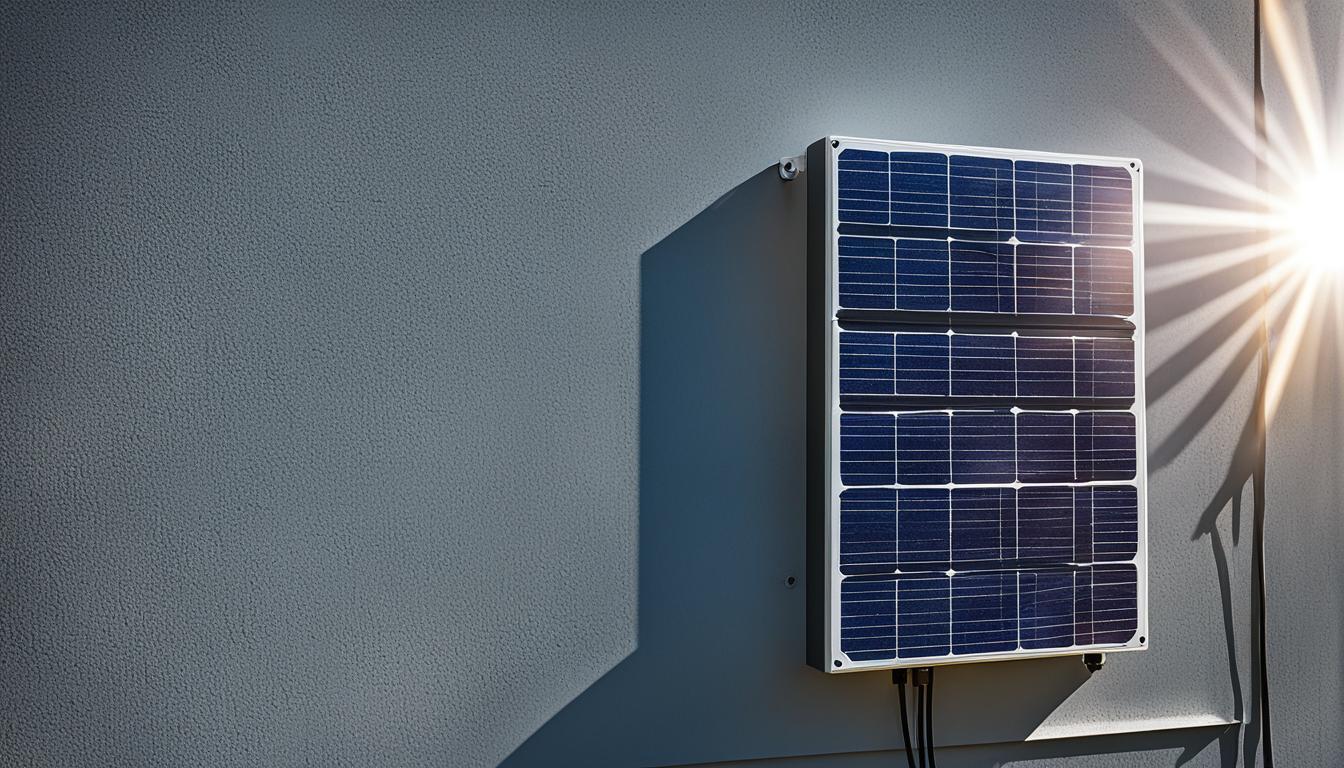



I found it interesting how the article focused on lead-acid batteries. Do you think they are still relevant in todays solar technology landscape, or should we be looking more towards newer options? Lets discuss!
Im not convinced about the longevity of lead-acid batteries for solar panels. Seems outdated compared to newer options mentioned. Whats your take on this? #SolarPowerDebate
I found it interesting how the article focused on lead-acid batteries, but I wish there was more discussion on other types like lithium-ion. Do you think lithium-ion batteries are a better option for solar panel systems? Lets discuss!
Im not convinced that lead-acid batteries are the best option for solar panels. I think lithium-ion batteries might be more efficient in the long run. What do you guys think?
Interesting read, but isnt the environmental cost of producing & disposing lead-acid batteries contradictory to the whole green energy idea? Just a thought.
Interesting read, but why not delve into the impact of extreme weather conditions on the lifespan of these solar batteries?
Interesting article, but wouldnt the lifespan of solar batteries largely depend on the climate and usage patterns too?
Interesting read, but havent we all wondered if the energy used to produce these solar batteries doesnt outweigh the benefits? Maybe its time we started talking about a solar battery paradox? Just a thought.
Interesting read, but dont you think the article oversimplified the lifespan of lead-acid batteries? I mean, come on, their performance isnt just about age, but also usage and maintenance, right?
Interesting article, but what about the environmental impact of disposing these lead-acid solar batteries after their lifespan ends?
Indeed, but arent we better off managing battery waste than fossil fuel aftermath?
Interesting read. But, how do weather conditions impact the lifespan of these solar batteries? Any studies on this?
Interesting read but I still wonder, arent solar batteries just a temporary band-aid for a much bigger energy crisis?
Solar batteries are stepping stones, not band-aids. Theyre part of a larger, sustainable solution.
Interesting read, but dont you think the environmental impact of manufacturing & disposing of these batteries outweighs the benefits of solar energy? Just a thought.
Interesting read! However, could the lifespan of solar batteries be extended with better maintenance or tech upgrades?
So, Lead-Acid Batteries for solar panels, worth the investment considering their lifespan or just an outdated option? Thoughts?